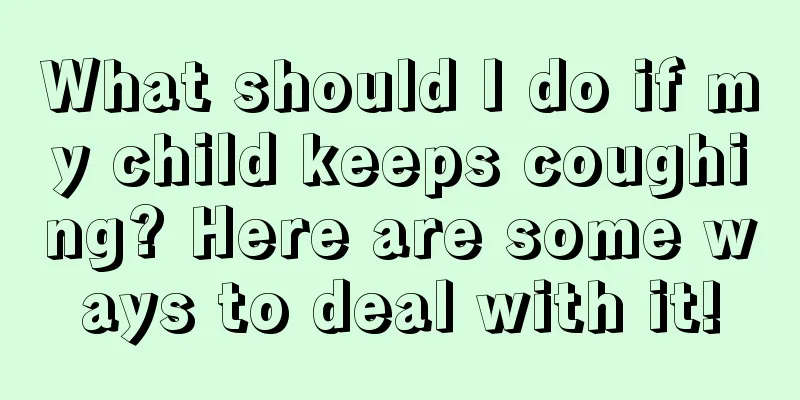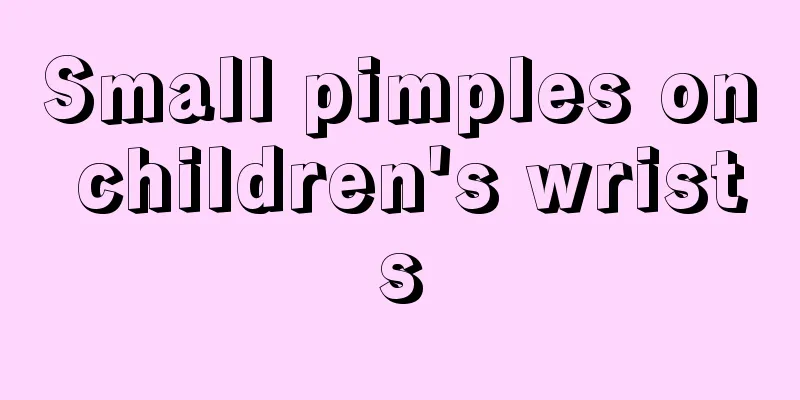Is it good for babies to drink more water and urinate more?

|
The weather in autumn and winter is abnormally dry. Water is very helpful for nourishing a person's body and skin. In order to ensure that water and oil are in a balanced stage, many parents will give their children plenty of water. Drinking water will lead to frequent urination. Parents will worry that drinking so much water may be bad for their children's health and easily cause edema. The weather is dry in autumn and winter, and moisture is the loyal guardian of baby's delicate skin. It can not only moisturize the skin, but also maintain a balance between moisture and oil in the skin, making the skin shiny and elastic. It can also keep the intestines and anus moist, soften stools, and prevent the baby from getting inflamed. Therefore, many mothers never turn back from the path of getting their babies to drink more water, and feed their children water at every turn, not knowing that this practice may very likely harm the children. When we say drink more water, we mean letting children drink as much water as possible within the normal range of their needs. This definitely does not mean letting children drink unlimited water. Babies of different ages have different daily water requirements, so mothers should not give their children excessive water. Babies have different water needs at different stages Infants under 6 months old According to the recommendations of the American Academy of Pediatrics: Infants under 6 months old do not need any additional fluids, including water, except breast milk and formula. Because more than 90% of breast milk is water, and the water content in milk powder is as high as 85%, it can fully meet the baby's needs for water. The stomach capacity of a newborn baby is limited. Additional water supplementation can easily take up the baby's stomach capacity, thereby affecting the baby's milk intake, leading to consequences such as malnutrition. Therefore, under normal circumstances, whether they are breastfed or bottle-fed, babies under 6 months old do not need additional water, even in hot weather. 6~ 12 months old baby According to domestic standards, babies aged 6 to 12 months need about 900 ml of water per day. However, in addition to ensuring that babies drink about 600ml of milk every day, babies at this stage must also add appropriate complementary foods. In other words, the baby's daily water intake = 900ml-600ml of milk-the water content in the complementary food. If the baby is given too much water, it will take up the baby's stomach capacity, thus affecting the intake of complementary food or milk, which can easily cause nutritional imbalance and affect growth and development. Children aged 1 to 4 years old According to the standard, the total daily water requirement for children aged 1 to 4 years old is 1300 ml. However, the diet structure of babies at this stage is richer. In addition to milk and staple foods, it may also include fruits, snacks, etc. Therefore, the amount of extra water needed daily = 1300ml - amount of milk - water content of staple food - water content of snacks/soups/fruits. According to this calculation, the amount of additional water that children aged 1 to 4 years old need every day is approximately 300 to 500 ml. In daily life, many mothers cannot be so careful in calculations, but they don’t know whether their babies are getting enough water. What should they do? In fact, it only takes one simple trick: look at the urine. Under normal circumstances, the baby's urine is transparent or light yellow, with no obvious pungent odor, and the baby urinates about 6-8 times a day. If the baby's urine is obviously yellow or the urine volume is small, it proves that the baby is dehydrated and the mother needs to replenish the baby with water in time. 4 times when it is not appropriate to replenish water However, when mothers replenish water for their babies, they should try to avoid these 4 moments: Before meals: Drinking water before meals can easily take up the baby's stomach capacity, affecting the baby's food intake, and can easily dilute the gastric juice, which is not conducive to food digestion. Half an hour after a meal: Half an hour after a meal is when the stomach digests food. Drinking water at this time can easily dilute the gastric juice and affect gastrointestinal health. 1 hour before bedtime: Drinking water before bedtime can easily cause your baby to urinate urgently in the middle of the night, affecting his sleep. After taking cough medicine: Usually cough medicine will adhere to the throat. Drinking water after taking cough medicine can easily wash away the active ingredients of the medicine, thus affecting the efficacy of the medicine. |
<<: What to do if your child urinates less frequently
>>: Urine routine examination in children
Recommend
What causes red bumps in babies?
A baby's skin is very tender and sensitive, s...
Is calcium lactate good for babies?
Calcium lactate is a food that can supplement cal...
What should I do if my child has blisters on his fingers?
When we are splashed with boiling water or scaldi...
Main ingredients and treatment of children's eczema cream
Children are more likely to get eczema, and eczem...
The dangers of flat head
Everyone has heard of the term flat head. Some pe...
Taking diarrhea milk powder still causes diarrhea
Many people do not understand what diarrhea milk ...
What should I do if my baby has heat stroke and fever?
Since babies have relatively poor immunity, they ...
What medicine should be used for children with diarrhea and vomiting
Children are more likely to suffer from enteritis...
What is the treatment for tooth decay in children?
What are the treatments for tooth decay in childr...
One year after child's lumbar injury
Children often play around and make a mess, so it...
How to deal with children's tinea pedis
Children are active and like to play with their f...
What to do if your one-year-old baby coughs
One-year-old babies are still relatively young an...
Reasons why children bite their nails
We should see some children have the habit of bit...
What are the reasons why babies always sweat?
Many parents find that their children often sweat...
What are the hazards of hair dye to babies?
Hair dyeing is very harmful to babies, especially...









